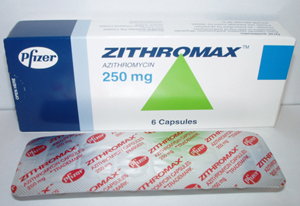Top Class Actions’s website and social media posts use affiliate links. If you make a purchase using such links, we may receive a commission, but it will not result in any additional charges to you. Please review our Affiliate Link Disclosure for more information.
Antiviral medications, not antibiotics, should be given to influenza patients but doctors are regularly over-prescribing antibiotics such as Zithromax to flu sufferers for whom antiviral therapy would have been more beneficial, according to an infectious disease specialist.
Dr. Fiona Havers, a medical officer for a branch of the U.S. Centers for Disease Control and Prevention branch of the CDC’s National Center for Immunization and Respiratory Diseases, mis-prescribed antibiotics can have serious side effects.
“Prescribing antibiotics for acute respiratory illness is often inappropriate and can put patients at risk for allergic reactions, antibiotic-resistant infections, and potentially deadly diarrhea caused by Clostridium difficile,” Havers said. “Antibiotics do not have activity against viruses.”
The CDC recommends early antiviral treatment — the drugs oseltamivir and zanamivir — for influenza sufferers who have high-risk medical conditions, as well as adults 65 and older, young children, pregnant women and people with underlying medical conditions such as chronic obstructive pulmonary disease, asthma, congestive heart failure, and diabetes. The drugs can mean the difference between a milder illness and hospitalization, according to Havers. To be most effective, the antiviral should be given within two days of illness onset.
Among influenza patients in the 2012-2013 flu season, 30 percent were prescribed one of three common antibiotics while just 16 percent received antiviral treatment. Antiviral drugs are a class of medications used for treating viral infections, while antibiotics like Zithromax are used for treating bacterial infections.
Zithromax, also known as azithromycin or Z-Pak, the commonly used antibiotic marketed by Pfizer Inc., is often prescribed to treat bacterial respiratory infections, in addition to skin infections, ear infections, and sexually transmitted diseases.
But recent studies have found a patient’s chances of sudden deadly heart problems more than doubled when taking the drug.
In March 2013, the U.S. Food and Drug Administration (FDA) issued an announcement that azithromycin can cause abnormal changes in the electrical activity of the heart that may lead to a potentially fatal irregular heart rhythm. Patients taking Zithromax were found to be twice as likely to die of a heart attack or sudden cardiac event as those taking the antibiotic amoxicillin. The highest risk group were those with heart disease.
The FDA required drug labels to be updated to strengthen the Warnings and Precautions section with information related to the risk of “a specific, rare heart rhythm abnormality” known as QT interval prolongation and torsades de pointes.
Zithromax has also been linked to the often fatal Stevens Johnson Syndrome (SJS). The disease presents with flu-like symptoms followed by a potentially life-threatening skin disease manifested by a rash similar to a burn, open sores and skin peeling. Other signs of the disease include a purplish rash, painful blisters of the mucus membranes, blisters on the eyes, nose, mouth, and genitals, sloughing off of skin in large patches, joint and muscle pain and a burning sensation all over the body. It is sometimes described as the skin burning from the inside out.
A more severe form of SJS is Toxic Epidermal Necrolysis (TEN), which is diagnosed when blisters meld and cover 30 percent or more of the body. The skin also peels off in layers, exposing the skin’s under layer, the dermis, and making the body ripe for infection.
Between 5 percent and 15 percent of SJS patients die from the side effects, while up to about 40 percent of TEN patients die. Those who survive face myriad medical problems including secondary skin infection (cellulitis), sepsis, blindness, internal organ damage and permanent skin damage.
Do YOU have a legal claim? Fill out the form on this page now for a free, immediate, and confidential case evaluation. The Zithromax attorneys who work with Top Class Actions will contact you if you qualify to let you know if an individual lawsuit or Zithromax class action lawsuit is best for you. [In general, Zithromax lawsuits are filed individually by each plaintiff and are not class actions.] Hurry — statutes of limitations may apply.
Get Help – It’s Free
Join a Free Zithromax Class Action Lawsuit Investigation
If you or a loved one had a heart attack, liver failure, Stevens Johnson Syndrome or Toxic Epidermal Necrolysis after taking Zithromax, Z-Pak, Zmax or azithromycin, you may have a legal claim. See if you qualify by filling out the short form below.
A Zithromax attorney will contact you if you qualify to discuss the details of your potential case at no charge to you.
Oops! We could not locate your form.
ATTORNEY ADVERTISING
Top Class Actions is a Proud Member of the American Bar Association
LEGAL INFORMATION IS NOT LEGAL ADVICE
Top Class Actions Legal Statement
©2008 – 2024 Top Class Actions® LLC
Various Trademarks held by their respective owners
This website is not intended for viewing or usage by European Union citizens.













